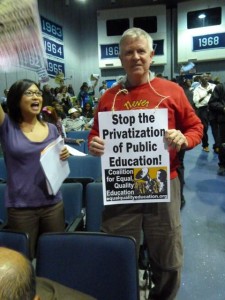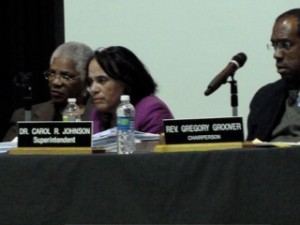 Boston Families and Teachers Protest
Boston Families and Teachers Protest
School Closings
by Jacqueline King and Ann O’Halloran
In a storm of protest, hundreds of parents, students, and teachers have packed into several Boston School Committee meetings at English High School this fall to resist the proposed closings, mergers, or charter takeovers of their schools.
The committee is scheduled to vote on the proposals Wednesday, Dec. 15, at a 6 p.m. meeting at English High, 144 McBride St., Jamaica Plain. A demonstration and “sign-up-to-speak” begin at 5:30 p.m. Leaders of the opposition are mobilizing to bus hundreds to the meeting in the hope of preventing or delaying a vote.
School Superintendent Carol Johnson proposes to close 11 schools, merge 10 into 5, and allow two to be taken over by charter schools — all part of her “Redesign and Reinvestment Plan” to close the $63 million school budget gap. Meanwhile, Boston is expected to lose $64 million to privately run Commonwealth charter schools this year. And deeper cuts are inevitable, as the city’s charter costs grow. Sixteen additional charter schools are waiting in the wings with applications to open in Boston in the coming years and siphon more students and public funds away from the public schools.
Deafening chants of “Save Our Schools!” and “They say cut back, we say fight back!” have resounded through the English High auditorium at several meetings. Students have rhythmically stomped their feet and brandished signs, and one time police lined up in front of the stage in a warning display. At most meetings, close to 100 people come to the microphone to demand or plead that their schools remain open, after having waited for hours while the School Committee conducted its business.
 Many schools have been thrown into turmoil with only 24 hours of notice that the superintendent had targeted their school. Parents have expressed fears for their children’s safety, if their schools are closed and the children moved around like pieces on a checkerboard. Some challenge the School Department’s assurance that they can find seats in “higher performing” nearby schools, noting that they have contacted those schools and found long waiting lists of siblings and others with higher priority than their children.
Many schools have been thrown into turmoil with only 24 hours of notice that the superintendent had targeted their school. Parents have expressed fears for their children’s safety, if their schools are closed and the children moved around like pieces on a checkerboard. Some challenge the School Department’s assurance that they can find seats in “higher performing” nearby schools, noting that they have contacted those schools and found long waiting lists of siblings and others with higher priority than their children.
“Our children cry every night,” said Vic and Luz Cosme, parents of students from the Ralph Waldo Emerson Elementary School in Roxbury. “Our children will be lacking in the motivation, desire, and excitement it takes to make it at a new school…You are taking a huge part of their future.” Their young daughter added, “Please don’t close the Emerson. It means the world to me.”
Most of the schools slated for closure, such as the Emerson, serve vulnerable student populations—including recent immigrants, English language learners, and students with learning disabilities. These students often struggle with standardized tests, which don’t reflect their true level of achievement or growth, or even help teachers determine how best to teach them. “Our schools are more than the MCAS scores!” was a repeated refrain at the meetings. Parents spoke of features that mattered more to them than test scores, such as a nurturing school environment, openness to parents, proximity to home, student and staff diversity, a rich and varied curriculum, and the staff’s ability to work with the particular strengths and needs of their children.
 The Emerson, with more than 63% English language learners, serves as an anchor for the Cape Verdean community in Boston. The Lee Academy Pilot School has a strong program for special needs students, in particular, children on the autism spectrum. The East Zone Early Learning Center provides surround care and education for young children of working families in Dorchester, and has a waiting list of more than 200 families. The Gavin Middle School serves a large number of recent immigrants and special needs students. At the Hyde Park Educational Complex, the Social Justice Academy is providing a curriculum with an emphasis on equity and social struggles. Teachers and parents asked, “If our scores are lagging, why don’t you help us, instead of closing down our schools?”
The Emerson, with more than 63% English language learners, serves as an anchor for the Cape Verdean community in Boston. The Lee Academy Pilot School has a strong program for special needs students, in particular, children on the autism spectrum. The East Zone Early Learning Center provides surround care and education for young children of working families in Dorchester, and has a waiting list of more than 200 families. The Gavin Middle School serves a large number of recent immigrants and special needs students. At the Hyde Park Educational Complex, the Social Justice Academy is providing a curriculum with an emphasis on equity and social struggles. Teachers and parents asked, “If our scores are lagging, why don’t you help us, instead of closing down our schools?”
Parents say they are fearful because of rumors that some schools may be closed so that charter schools can be moved into their buildings. Â For example, the Agassiz School in Jamaica Plain serves a large population of ELL students and has been making significant progress as a turnaround school, yet is proposed for closure. Eighty-three percent of their students passed the MCAS math and English tests last year. Jacquelyn Driscoll, a teacher at Agassiz, said to the School Committee last week, “The MATCH International Charter School application, with letters of support from a Deputy Superintendent and a School Committee member, is looking to move into a leased school building in Jamaica Plain. Do you know of any other school buildings closing in J.P.? Well, our school may be closed.”
Earlier this fall, Johnson sought to portray the closings as motivated by an “educational decision” to rescue students from “underperforming” schools, but many challenged that assertion. Parents pointed out that she was urging them to apply to schools with MCAS scores similar to or worse than those of the schools she wants to close. Now she has reframed the issue as a necessary move to address the $63 million budget shortfall.
The School Department is also aiming to cut transportation costs by eliminating bus routes. With that in mind, they are preparing a new student assignment plan that will increase the number of zones in the district, reduce the school choices families will have, and increase segregation. The Boston Coalition for Equal Quality Education (CEQE) has fought off these attempts two times in recent years, but the School Department seems determined to ram it through this time.
The Boston Municipal Research Bureau and The Boston Globe have played a destructive role in this crisis. When Johnson first proposed a smaller number of school closings, they publicly scolded her for insufficient ruthlessness, and urged her to bite the bullet, make much deeper cuts, and to be prepared to withstand community outrage. At the same time, the Globe continues to tout charter schools as the important new direction for education.
The Boston CEQE has played a key role in mobilizing the protests. They have held press conferences and picket lines outside English High and have organized busloads of students and supporters from different parts of the city to attend. The bus drivers union has provided free labor for transportation.
One parent expressed the determination that many feel—not to let themselves be pitted against those in other schools in a scramble for survival. “We’re here to advocate, but not at the expense of the other schools,” said Carl Nagy-Koechlin, parent of two children at the Lee Academy. “There are people here who would walk across hot coals to save our schools…$63 million is a lot of money, but our kids’ education is priceless. We need to stand together and fight this.”
_____________________________________________________________________
Jacqueline King is a Board Member of Citizens for Public Schools and Co-Editor of “The Backpack.” Ann O’Halloran is a Board Member and Massachusetts 2007 History Teacher of the Year.

